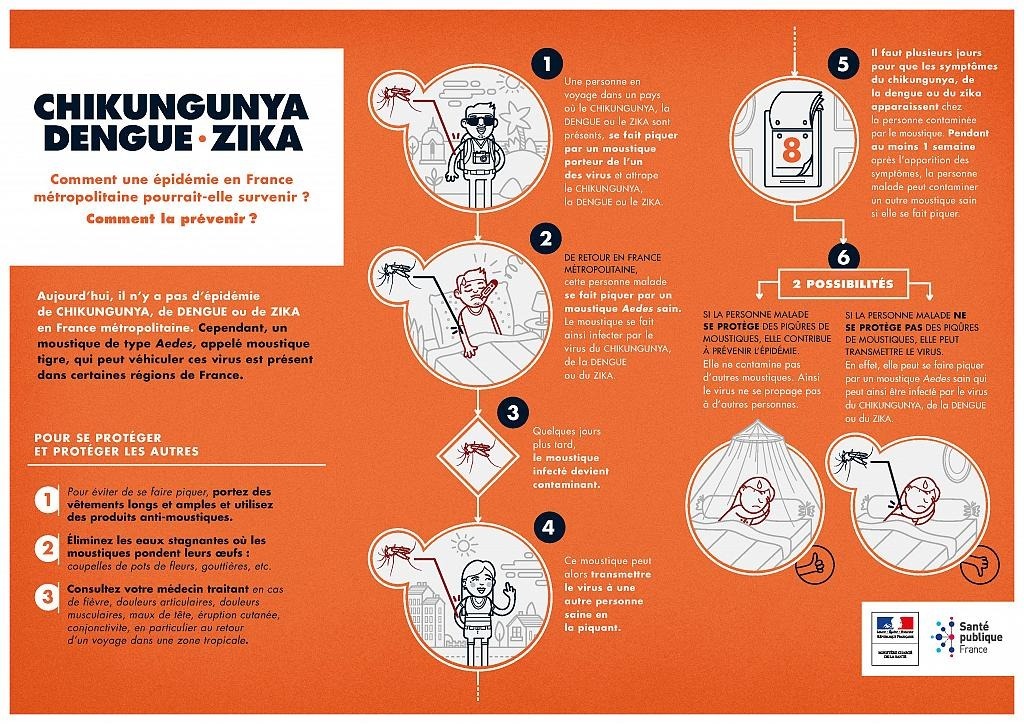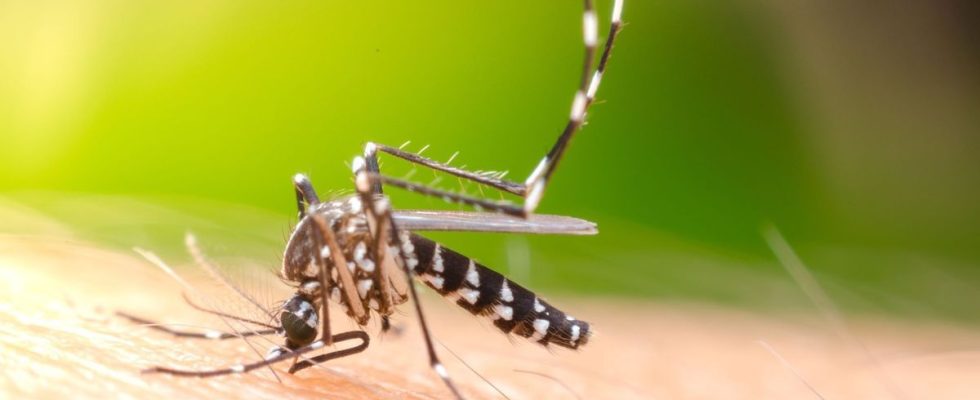Published on
Updated
Reading 3 min.
in collaboration with
Dr Gérald Kierzek (Medical Director of Doctissimo)
A very first case of indigenous dengue fever was recorded in Limeil-Brévannes (Val-de-Marne), located about fifteen kilometers southeast of Paris. It was confirmed by the Ile-de-France Regional Health Agency. How to protect yourself from dengue fever? Let’s take stock with Dr Gérald Kierzek, emergency doctor and medical director of Doctissimo.
It’s a first. A case of indigenous dengue fever was detected near Paris, in the town of Limeil-Brévannes, located in Val-de-Marne. The Ile-de-France Regional Health Agency confirmed this information.
A first case of dengue fever in the Ile-de-France region, transmitted by a mosquito
According to the health authorities, who announced it on October 17, this is the “first indigenous case of dengue in Île-de-France”. This means that the affected person has not recently traveled to a part of the globe affected by the disease, but that they were bitten by a mosquito carrying the dengue virus, here in France.
The town of Limeil-Brévannes has also committed “two successive mosquito control campaigns” specifies the ARS press release. The first one “took place on the night of Sunday October 15 to Monday October 16″ And “the second is planned for the night of Friday October 20 to Saturday October 21 if weather conditions permit, and will be postponed otherwise..
An “exceptional” epidemiological situation in France
Usually, dengue is a disease of the southern hemisphere. But in recent years, thanks to global warming and the increase in tiger mosquitoes, cases have migrated, and have been observed more in the south of the country.
This explains France’s current situation with regard to dengue, described as “exceptional” by Public Health France, in 2022. That year, the number of cases was estimated at 66, exceeding those having could be counted over the period 2010-2021 which were 48. For 2023, the health authorities already count around thirty.
“Dengue is a mild viral disease” firstly recalls Dr Gérald Kierzek. “It can be asymptomatic or cause fever and sometimes, in rarer cases, digestive, hemorrhagic, cutaneous or neurological complications.“However, it is important to protect yourself from this disease.
To protect yourself from this viral pathology, the only way to act is to avoid the multiplication of mosquitoes, vectors of the disease, and to protect yourself from their bites. “Prevention involves eradicating mosquito nesting sites, which are stagnant water” reminds the doctor. You must therefore eliminate saucers, cups and other containers from your interior, your balcony or your garden, which may contain stagnant water. “Finally, the question of vaccination arises, since a vaccine exists, but it is not really used and its indications are very limited.”
In addition to avoiding the multiplication of mosquitoes, it is important to protect yourself from their bites by wearing loose clothing and using mosquito nets and insecticides, if necessary. Finally, if you have symptoms, do not hesitate to consult your doctor.

Practical advice to protect yourself
It is therefore recommended for prevent the proliferation of mosquitoes
- Remove the saucers or empty the water regularly, change the water in flower vases 2 to 3 times a week (otherwise have plants in the ground or fill the bottom of pots with damp sand);
- Cover rainwater collection barrels and wells with a mosquito net or fabric;
- Protect the overflow of the tanks in the same way;
- Check the good condition of gutters, channels, rainwater manholes and the good flow of water in general;
- Eliminate all waste, bulky items and various objects that could act as containers around the home (bottles, tires, trays, cans, etc.).
To protect yourself from mosquito bitesit is recommended to:
- Wear loose, covering clothing;
- Use a skin repellent, preferably in the morning and evening, recommended by a pharmacist, on exposed areas of skin;
- If necessary, use mosquito nets on openings (doors and windows);
- Use crib nets for newborns;
- Use electric diffusers inside homes;
- Use insecticide coils only outdoors;
- Use air conditioners or fans that annoy mosquitoes.
Finally, it is important to immediately consult your doctor if you have symptoms. suggestive symptoms (high fever, muscle or joint pain, eye pain, fatigue, headaches, etc.).
